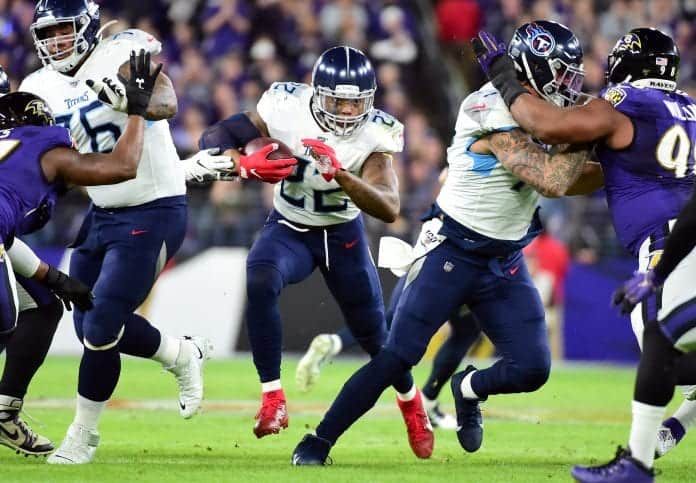The Tennessee Titans were involved in their second consecutive upset victory on Saturday when they defeated the first-seeded Baltimore Ravens. Heisman-winning running back Derrick Henry had an all-time great NFL playoff performance, totaling 195 yards on 30 carries, an astounding 6.5 yards per attempt. He even threw a touchdown pass on a trick play. Of course, he didn’t win the game entirely by himself. Any time a surprise victory like this happens, the entire team needs to perform at a high level, and this game was no exception.
Quarterback Ryan Tannehill hit on a few big throws to set the Titans up with an early lead, and the Tennessee defense made life difficult for Baltimore at every turn, stopping them on all four of their fourth-down attempts, including twice on fourth-and-one. They also forced likely NFL MVP Lamar Jackson into committing three turnovers.
But it is an undeniable fact that the Titans would not have made it this far into the NFL playoffs without Henry. Because they needed to win their Week 17 game against the Houston Texans in order to make the playoffs at all, Tennessee functionally played three must-win games in a row. Across that stretch, Henry carried the ball 96 times for 588 yards and became the first running back in NFL history to rush for more than 180 yards in three straight games.
Quantifying Henry’s excellence using the OSM
Henry’s dominance should come as no surprise those familiar with PFN’s Offensive Share Metric (OSM). This metric measures how much of a player’s statistical production that they were directly responsible for. For example, a wide receiver who gains most of their yards after the catch would have a higher grade than one that was tackled immediately after catching the ball.
According to the OSM, Henry was the best running back in the NFL during the regular season, with an overall grade of 21.27. His grade against Baltimore was even more impressive, at 34.67. That is a remarkably high grade for a running back, the eighth-highest recorded by any player at that position so far this season. It implies that Henry’s dominant performance in the second round of the NFL playoffs was primarily the result of his own efforts, making it even more impressive.
Explaining why Henry’s grade against the Ravens was so high
A quick examination of the factors involved in calculating a running back’s OSM grade reveals why Henry performed so well on Saturday. The most relevant statistic is what the NFL calls an “efficiency rating.” The metric is calculated by taking the number of yards of physical distance that the running back ran and dividing it by the total number of statistical yards that they gained. The higher the number is, the less efficient the player was as a runner. In short, the efficiency rating tells us whether the running back generally ran straight ahead, or had a tendency to dance around in the backfield.
The reason running back efficiency was so crucial to this game is this: going into the Divisional Round (as we mentioned in our OSM preview for this matchup), the Ravens only regular-season losses came against teams whose feature running back had an efficiency rating lower than 3.0. That is not an easy mark to reach. Most running backs end up with a rating somewhere between 3.5 and 4.5. Fortunately for the Titans, Henry has not played like an average running back during the NFL playoffs, and his efficiency rating on Saturday was 3.0 exactly.
Henry’s success wasn’t the result of a lack of effort on Baltimore’s part either. The Ravens placed eight or more defenders in the box on 63.33% of Henry’s carries, hoping to slow him down, but it simply didn’t matter. Henry ran straight ahead no matter what the Ravens threw at him and was rewarded for his persistence. His efficiency, despite all resources Baltimore dedicated to stopping him, resulted in a very high OSM grade.
Henry’s outlook for the rest of the NFL playoffs
It will be fascinating to see if, in this age of high-flying passing offenses, a team can ride their bruising running back all the way to the Super Bowl. Tennessee’s opponent in the AFC Championship Game, the Kansas City Chiefs, had the seventh-worst rush defense during the regular season, so Henry might be in for another big performance next weekend. That was certainly true when the two teams met during the regular season when Henry rushed for 188 yards and two touchdowns en route to a Titans victory.
The Chiefs will need to find a way to slow him down if they hope to win the rematch. If they can’t, Tennessee will be one step closer to their first Super Bowl victory. Regardless of where his season ends, Henry has already had one of the most dominant NFL playoff runs by a running back in recent memory. Anything he does from here on out will only add to that legacy.

